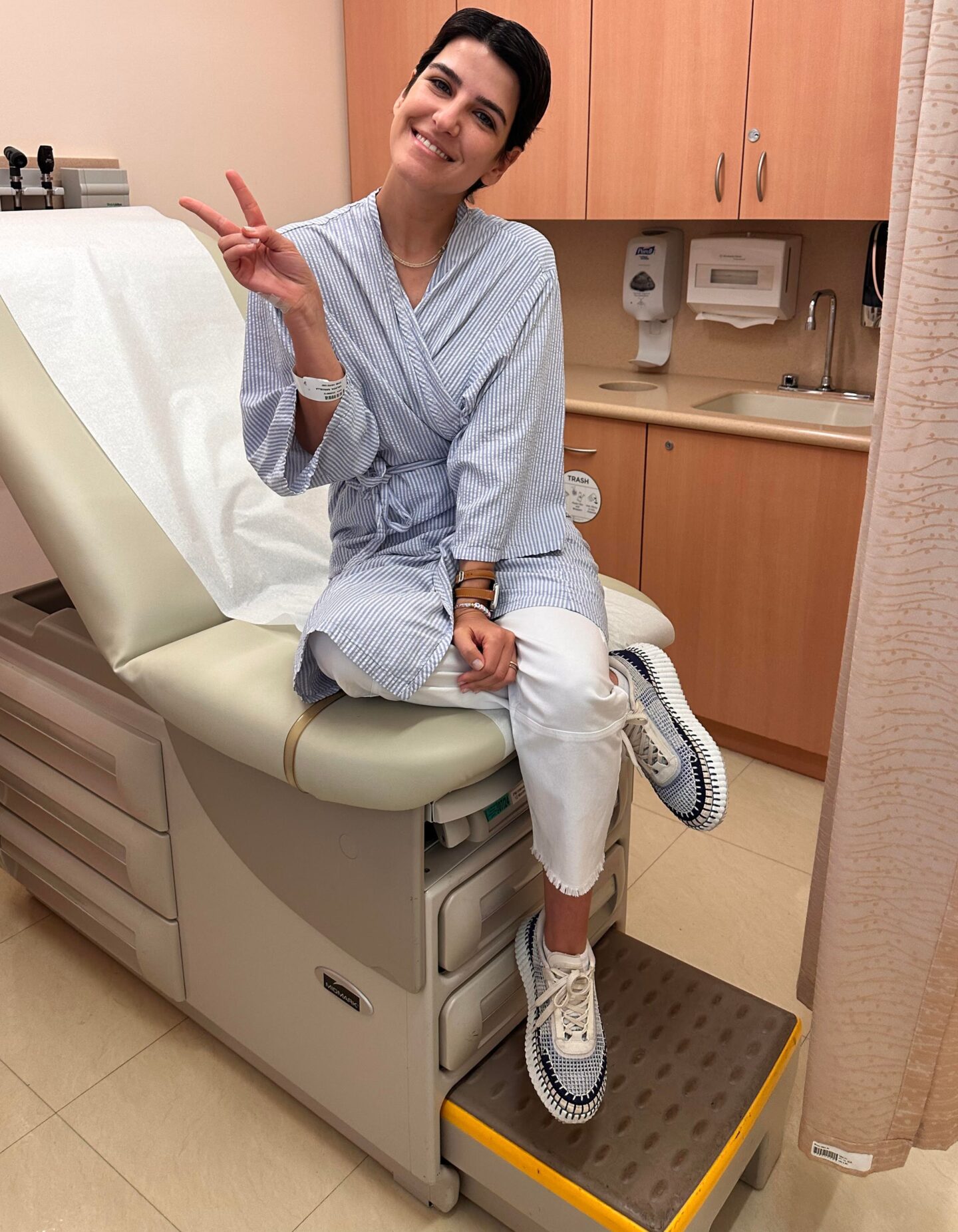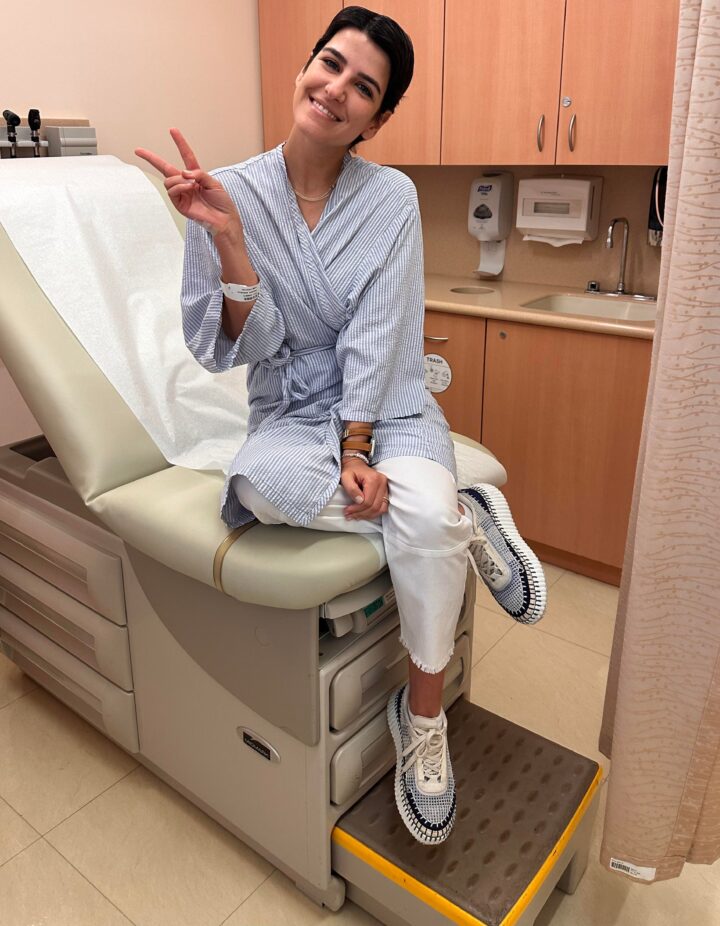On August 18th, 2022, when my daughter was only four months old, and my son four years old, I was diagnosed with Triple Negative Breast Cancer.
At the time, I was 35 years old, perfectly healthy, with no family history of breast cancer. When I asked my physician a few months prior if I was at risk of breast cancer, he said my risk was low. Something in my heart told me otherwise, though. In some ways, when I was diagnosed, I was shocked. In other ways, I always knew it could happen to me. I was familiar with the statistic that one in eight women develop breast cancer in their lifetime and that breast cancer is the most commonly diagnosed cancer during pregnancy. So why wouldn’t it be me?
For as long as I can remember, I’ve checked my breasts, and I checked them often. I got to know them as well as possible, which is hard for a busy mom with very little downtime. I got used to taking advantage of opportunities like the shower, watching Netflix, or even sitting in the passenger seat as a chance to feel around. I created opportunities to check in otherwise uneventful moments.
On August 12th, while in the passenger seat of my car, as my husband drove us to our first solo trip in years, I decided to do a superficial check of my breasts. It was hot, so I was wearing a sleeveless dress, which made it minimally inconvenient. I felt around my collarbone, under my armpits, around the sides, and on top of my breasts. As I ran my hand over my left breast, over the tissue that sits just over the breast bone, I noticed a hardness. It wasn’t a lump, and it wasn’t round. The tissue just felt hard, in a way that it never had before. I checked my right breast; soft, plump, unremarkable.
It is probably nothing, maybe a clogged duct, but I needed to know for sure. I am lucky to call my OBGYN, Dr Sheiva Ghofrany a dear friend, so I texted her immediately. In her usual non-alarmist but empowering way, she recommended I go directly to imaging to figure out what was causing the change in my breast texture. I called my local hospital directly, told them my situation, and was booked for a mammogram and ultrasound within five minutes.
What happened after that was a blur; a painful, terrifying, adrenaline-fueled blur. At my mammogram, my radiologist looked troubled and concerned as she reviewed my images. She couldn’t tell me exactly what she was seeing, but she knew that it needed to be biopsied immediately. Because of the urgent nature of her concern, she booked me for a biopsy appointment the next day. When MyChart updated that night, I naively read my notes. “BI-Rads 4,” it said. I Googled the term, discovering that it represented a 95% chance of malignancy. This was real – something was very wrong.
The days following my biopsy, awaiting my results, were a haze. It was hard to look at my children. I felt devastated, lost, scared. I’d never get to see them grow up. I survived on anti-anxiety medication and some level of denial. When I finally got the call confirming my diagnosis three days later, there was one piece of good news among the bad news: I caught it early.
With breast cancer, even in the most aggressive types like Triple Negative, in most cases, the difference between life and death is early detection. Triple Negative (TNBC) is the most aggressive form of Invasive Ductal Carcinoma because it is fast growing, and it contains no receptors such as Estrogen, Progesterone or the Her-2 protein. This means that, unlike other forms of breast cancer, it does not have specific targets for chemotherapy to manipulate and, therefore, eradicate. But thanks to many advances in breast cancer research, new treatments are showing promising signs of improving prognosis. But here’s the thing: timing matters. Triple Negative grows and spreads very quickly, so the sooner you find it, the more effective the treatment can be.
Though I would not wish this diagnosis on anyone, I learned so much about my own body and its limits, and the importance of looking after it just as well as we look after our children’s bodies. I am forever grateful for these lessons. As mothers, it is so easy to deprioritize ourselves, but I realized through breast cancer that denying ourselves time to look after our bodies can lead you to miss very clear warning signs. So make the time to check in, if not for yourself, for your family.
Get to know your breasts by frequently familiarizing yourself with them. Learn their normal texture, firmness, lumpiness, softness. How do they feel before your period? After? Feel them in various positions when you’re watching TV. Feel around- does it feel like the breasts you felt just a few weeks ago? Don’t worry about doing it perfectly; a perfect breast check just requires you to answer the question: is this normal? If you see any changes, such as a rash, dimpling, discharge, firmness in your tissue, nipple changes, lumps, or swelling, don’t ignore it. Contact your OBGYN or GP and request an appointment or a referral for a mammogram and ultrasound. Don’t be afraid to advocate for yourself; your life might depend on it.


